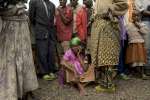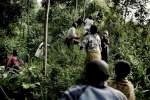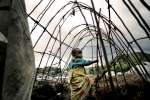- Text size
 |
|  |
|  |
| 
- Français
A decade on the run: Rwandan refugees' life mirrors the tumult of Africa's Great Lakes
News Stories, 26 October 2006

MUHANGA DISTRICT, Rwanda, October 26 (UNHCR) – After an epic decade on the move, victims to every spasm of war that has convulsed Africa's Great Lake's region, Rwandan refugees Hilarie Mukamurara and her husband, Pierre Myiridandi, finally made it back to their home village last year – only to find that their three plots of land had been illegally sold in their absence.
Land disputes are all too common for returning refugees the world over, but this one took a deadly serious turn. The interloping landowner hauled Pierre, a 53-year-old farmer, in front of one of Rwanda's traditional gacaca courts and accused him of participation in the 1994 Rwandan genocide. (The gacaca courts, based on traditional justice, were set up by the government to clear a judicial backlog and put on trial the vast number of genocide suspects languishing for years in Rwandan jails.)
"The new owner of the land is trying to accuse me of genocide in order to prevent me from recovering my land," says Pierre. "But my neighbours know that I am innocent of any crime and I have not been convicted by any of his false testimonies." He says he was able to prove that in 1994 he was not even in his home village – he was in another province studying as an adult student in a secondary school – "so there was no way I could participate in the events that happened in my village at that time."
Fortunately for Pierre, his neighbours confirmed his story and he was acquitted. Now he's focusing his efforts on getting back his land from his accuser.
It's been a long and tortuous journey since the day in 1994 that Pierre's family joined two million other Rwandans in fleeing the country in the aftermath of the genocide, a 100-day killing frenzy in which some 800,000 minority Tutsis and moderate Hutus were slaughtered by their neighbours.
"The war in Rwanda in 1994 forced us to flee to DRC leaving behind everything we had," Hilarie recalls, referring to the Democratic Republic of the Congo, which was called Zaire at the time, and took in 1.2 million Rwandan refugees.
For two years they lived in a UNHCR refugee camp in the South Kivu region of eastern DRC, until the camps were shut down during the 1996 war in which rebel leader Laurent-Desiré Kabila seized power from then president Mobutu Sese Seko.
Refugees dispersed within the dense forests of eastern DRC. Looking for safety and a way to get back to Rwanda, Hilarie and Pierre's family travelled for more than eight years from one place to another within the bush of the immense African country.
"We were locked in the forest with no house and suffering from insecurity, cold and hunger" Hilarie recalls. "We used to build small huts made of palm tree leaves to protect ourselves against the cold and the rain and sometimes we managed to work as farmers for the Congolese population."
Adds Pierre: "Rebel army groups in DRC prevented us from finding a safe way to came back to Rwanda for many years." They were also cut off from real news from the outside world.
"We used to come across people who brought us news about the peaceful current situation in Rwanda," says Pierre. "In the bush [in DRC], we did not have radio signals so peasants were our only source of information."
Even after a decade on the run, their saga – Congolese history in microcosm – was not over. In 2004 they were kidnapped by Mai-Mai rebels, the ragtag remains of bizarre "magic militias" that had fought DRC's central government, emboldened by their belief that water and charms could protect them from bullets.
Imprisoned in a house by the Mai-Mai, Hilarie and Pierre's family finally managed to escape, but lost the youngest of their five children, a 14-year-old boy, in the dramatic flight. Hoping that someone would take care of their lost son, they adopted a former neighbour's daughter whom they found wandering in the forest. Finally, they managed to reach the trucks of UN peacekeepers (MONUC) that transported them to a collection centre so UNHCR could bring the family back to Rwanda.
There they began to pick up the pieces. Aside from the three plots of land that were illegally sold by Pierre's sister, they had a house, which they reclaimed and rebuilt with the help of friends and neighbours.
Hilarie regained her job as a teacher, but it didn't solve all their problems. "The 42,000 Rwandan Francs (about $75 U.S.) I am paid is very little to feed the family and pay the school fees for my children," says Hilary. "Life would change a lot for us if we would be able to recover our property."
But they have just had some good news to alleviate some of the sorrow and hardship they have experienced. "We recently had news from somebody who apparently saw our child in DRC," says Hilarie, "so we still have a hope of seeing him again."
By Beatriz Gonzalez in Rwanda













































